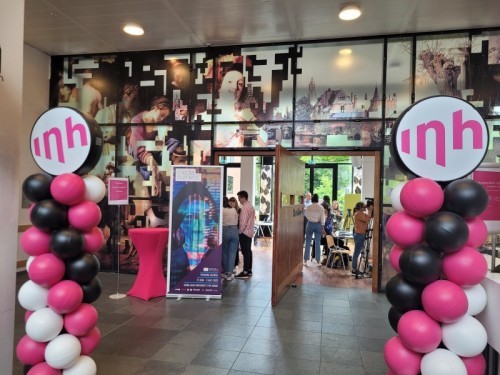MediaNumeric project brings data literacy to Creative Business programmes

The first casualty of war is truth, they say. But it can often be complicated to separate fact from fiction in other high-profile discussions too. So how do you deal with this as a creative professional? How do you teach data drives to tell stories? This question is central to the Erasmus+ MediaNumeric project, for which Inholland University of Applied Sciences organised a summer school in June. 'It’s a testing ground for getting data literacy into our degree programmes.'
Educational and heritage institutions from the Netherlands, France, Poland and Estonia are collaborating within the MediaNumeric project. 'Archives like ours are becoming more and more accessible digitally, also for new target groups', says project coordinator Johan Oomen of the Netherlands Institute for Sound and Vision, which is coordinating MediaNumeric. 'But how can you make good use of all this data? How can you spot misinformation, how do you check the origin, the context, the sources? By linking heritage institutions to educational institutions within MediaNumeric, we want to teach professionals how to tell stories using data.'
We want professionals to learn how to tell stories using data.
Three training courses
The MediaNumeric partners are organising three comprehensive training courses for students, teaching them how to tell stories using data. The first took place in February in Paris. The second was held at Inholland University of Applied Sciences The Hague in June, and a third is scheduled in Warsaw. To determine the content of the training courses, MediaNumeric researchers conducted interviews with experts such as data scientists, data journalists and archive staff. 'We wanted to discover the most requested skills for young professionals', says Natalia Berger, researcher at the Inclusion and the Creative Industries professorship. 'Finding, interpreting, analysing and presenting data are important skills for journalists and creative professionals. We incorporated this into the training courses.'
Intensive programme
A varied group of students from the countries concerned were able to benefit from an intensive 6-day programme in The Hague. 'We started with the theory in the mornings', says Natalia. 'The legal and ethical issues relating to data, the numerous tools available for working with data and how to organise a data project, for example. In the afternoons, they worked in groups on their own chosen case study within the theme of diversity in the music industry. Eventually, they presented their stories in front of a jury on the last day.'
Finding, interpreting, analysing and presenting data are important skills for journalists and creative professionals.

Testing grounds
As Education and Research manager of the Faculty of Creative Business, Jannerieke Hommenga is pleased that Inholland University of Applied Sciences is a partner in the project. 'Data literacy is relevant to all our degree programmes. We regard the training courses as testing grounds for getting data literacy into our programmes. What do they trigger in students and how can we incorporate topics such as collecting and analysing data and recognising fake news into our teaching?'
For primary and secondary schools too
'Among other things, our ultimate goal is to deliver educational modules that the parties concerned, as well as other educational institutions, can use to work with methods to find data and search through collections', says Johan. 'It's a way of combating misinformation. This should be reflected more widely in education as part of media literacy. Not just in vocational and higher education, but also in primary and secondary schools.'
Data literacy is relevant to all our programmes.

Embedding in the curriculum
Natalia and her colleagues are tasked with finding out how data literacy can be grounded in the curricula of the Creative Business degree programmes. 'Roughly speaking, there are two ways of doing this', she explains. 'We can embed it in the curriculum: incorporate data literacy into as many courses as possible to really get it into the students' mindset. Or we can set up in-depth modules that allow students in years 3 and 4 to work on their operational skills in multidisciplinary groups. We actually prefer to use both approaches. We are examining how we can develop this in practice in a think tank with people from the programmes. In addition, the summer school in The Hague and the subsequent survey among the participants provided new insight into what works and what doesn't.'
Reactions from students
What did the students think of the summer school? 'You really do learn a lot in a short period of time. It seems technical, but you can work it out', said one student. 'The tools you get to work with are very useful for your future career', added another. 'You learn from the personal experiences of experts and from their valuable insights, and that's something you wouldn’t usually get otherwise', felt another student. 'What you learn about fact-checking and creative storytelling is appropriate for every degree programme', said another. It therefore seems likely that MediaNumeric will lead to an excellent educational innovation.


